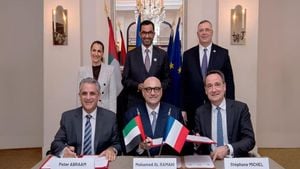U.S.-Ukraine relations have reached a pivotal moment as President Volodymyr Zelensky rejected demands from the Trump administration for significant natural resource concessions. During a press conference held in Kyiv, Zelensky voiced his strong opposition to American proposals, stressing, "I will not sign something my country will have to repay for ten generations." His statement followed U.S. requests for Ukraine to allocate $500 billion from its natural resources, raising concerns about the terms of proposed financial arrangements.
Analysts have noted the stark disparity between the U.S. expectations and the support Ukraine has received, estimated at around $120 billion. Zelensky highlighted the impracticality of fulfilling U.S. demands, noting the financial burden would require 250 years to repay at current resource revenue levels. He criticized the proposal's stipulation requiring Ukraine to return double the amount of any future assistance, calling it "a loan with 100% interest rate." Amid the backdrop of this financial dilemma, Zelensky announced the hosting of a summit involving over 30 European leaders, focusing on military aid and security guarantees.
The tensions between Trump and Zelensky escalated after the former questioned the legitimacy of the Ukrainian leader, labeling him "a dictator without elections" and adopting Kremlin rhetoric. Zelensky, emphasizing the need for peace, even suggested he might step down if it could lead to resolution, humorously proposing to trade his position for Ukraine's NATO membership, indicating the resistance both Trump and Putin have to Ukraine joining the alliance.
On Saturday evening, Trump intensified his pressure on Ukraine to finalize the mineral agreement under negotiation for over ten days. Several versions of this agreement have been rejected due to the lack of specific U.S. security guarantees necessary to protect Kyiv from Russian aggression. Zelensky insisted he would not accept any U.S.-Russia agreements without Ukraine's involvement, stating, "This is how we see the negotiations: Ukraine as part of Europe, Europe, the United States, and Russia." Trump noted, "I think we are close to an agreement; we’d best be close to one," as he stressed the need for the U.S. to receive some form of return for its prior military and economic assistance.
Currently, the war continues, with increasing pressure from Russia. The Ukrainian Air Force reported the largest attack with 267 Russian drones on Ukrainian cities since the conflict began nearly three years ago. This escalation of hostilities highlights the urgency and complexity of finding common ground among the involved nations, as Zelensky stated he may eventually have no choice but to accept the restrictive U.S. agreement if necessary.
While the U.S. seeks favorable terms for its involvement, Macron's stance reflects European priorities amid calls for military and financial aid for Ukraine, with notions of long-lasting peace on the table. Macon reaffirmed, "Peace cannot mean the capitulation of Ukraine," during his discussions with Trump. He stressed the importance of maintaining Ukraine's sovereignty throughout the negotiation process, declaring, "We must be united to defend peace and security" and acknowledging Europe's long-standing commitment to Ukraine.
Macron's appeal for continued support from Europe and recognition for the sacrifices already made reflects the collective responsibility Europe faces to build a long-term security framework for Ukraine. Meanwhile, Trump's administration is viewed as more transactional, seeking tangible returns and immediate outcomes, illustrating contrasting approaches toward the Ukraine situation.
The discord between Trump's push for immediate returns on investment and Macron's call for long-term strategies encapsulates the broader geopolitical dynamics at play. Trump’s firm stance on the urgency of ending the war aligns with Zelensky’s need to navigate complex international waters, especially as Russia asserts its demands for territorial concessions and NATO restrictions on Ukraine, which appear irreconcilable with Zelensky's vision for national sovereignty.
Going forward, both leaders face the challenge of reconciling their differing approaches amid the growing urgency of conflict resolution. Macron's diplomatic and security frameworks must align with Trump's more immediatist strategies, paving the way forward for Ukraine's peace negotiations amid continued international scrutiny.



